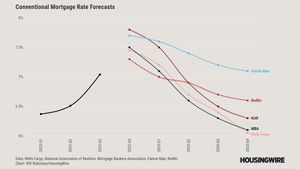CARACAS, Venezuela -- The recent release of six American detainees by the Venezuelan government has marked a significant diplomatic maneuver by the Trump administration, which seeks to reshape its approach to the country. The individuals, released after a meeting between Venezuelan President Nicolás Maduro and special envoy Richard Grenell, were welcomed back to the U.S. amid controversial plans for the deportation of hundreds of thousands of Venezuelans back to their homeland.
The announcement came as Grenell unexpectedly visited Caracas, spurring debates on whether this symbolizes improved relations with the Maduro regime. "We are wheels up and headed home with these 6 American citizens," Grenell stated on social media, sharing images of their return. This surprising visit has raised eyebrows, especially among those who hoped for continued pressure on Maduro's controversial government as the Trump administration previously maintained sanctions against the regime.
President Trump, who has been vocally opposed to Maduro’s leadership, contended during press briefings, "No. We want to do something with Venezuela. I’ve been a very big opponent of Venezuela and Maduro. They’ve treated us not so good, but they’ve treated, more so, the Venezuelan people, very badly." Despite these sentiments, journalists and critics fear this engagement might lend legitimacy to Maduro's controversial government.
Venezuela's acceptance to take back deported Venezuelans, including members of the Tren de Aragua gang, could dramatically alter the immigration status for many who have fled the country due to its dire economic and political climate. Trump announced on social media, "Venezuela has agreed to receive back all Venezuela illegal aliens who were encamped in the U.S., including gang members of Tren de Aragua. Venezuela has agreed to supply the transportation back." This deal could potentially clear the way for the deportation of hundreds of thousands of Venezuelans who currently hold temporary protected status.
According to experts, the backdrop to these developments is chilling. Human rights advocates have voiced concern over the repatriation of individuals to Venezuela marked by political repression and economic decay. Since 2013, over 7.7 million Venezuelans have left their homeland, turning toward the U.S. for refuge from starvation, violence, and authoritarian rule.
The timing of these diplomatic moves cannot be overstated, coming on the heels of Maduro’s recently claimed re-election—an event deemed illegitimate by international observers and many Venezuelans themselves. Observers report the Venezuelan president likely lost the election by more than two-to-one margins, with the opposition bloc rallying behind Edmundo González, who is now residing abroad under threat of arrest.
Among the detainees whose release Grenell facilitated was David Estrella, accused by the Maduro government of being involved in plots against the regime. While the White House and Maduro have sent mixed messaging, both sides appear motivated to negotiate terms beneficial to their political narratives. Maduro, closely attuned to the need for showing strength against foreign influence, reportedly responded positively to Grenell's visit, declaring it as heralding "initial agreements."
The broader ramifications of Trump's deportation agreement with Venezuela extend well beyond the immediate hostages' return. The Trump administration has already reversed protections for hundreds of thousands of Venezuelans under temporary protected status, adding urgency to the discussions about their potential return. This week, Homeland Security Secretary Kristi L. Noem rescinded extensions for 600,000 Venezuelans who would otherwise be allowed to stay until 2026, arguing it was time to end the allowance.
On the U.S. side, the administration has engaged El Salvador for potential arrangements to process these deportees, with plans reportedly including members of the Tren de Aragua. Mauricio Claver-Carone, the State Department's special envoy for Latin America, emphasized the importance of making these deportations happen, stating, "If we commit to reviving agreements and include ... members of the Tren de Aragua gang, I bet they're going to want to go back to Venezuela instead of dealing with the Mara prisons."
This situation continues to play out against volatile political landscapes, where both Trump’s and Maduro’s governments are facing considerable scrutiny. While the U.S. administration claims it aims to protect its national interests, critics argue such policies could bolster Maduro’s regime brutally oppressing dissent within Venezuela.
The prospects of resolving Venezuela's political crisis remain dim as countless lives continue to be affected by the harsh realities of migration and diplomatic entanglements. With both governments seemingly eager to leverage this deal for domestic gains, questions linger about the future of Venezuelans displaced from their homes seeking refuge from a regime they continue to flee.



